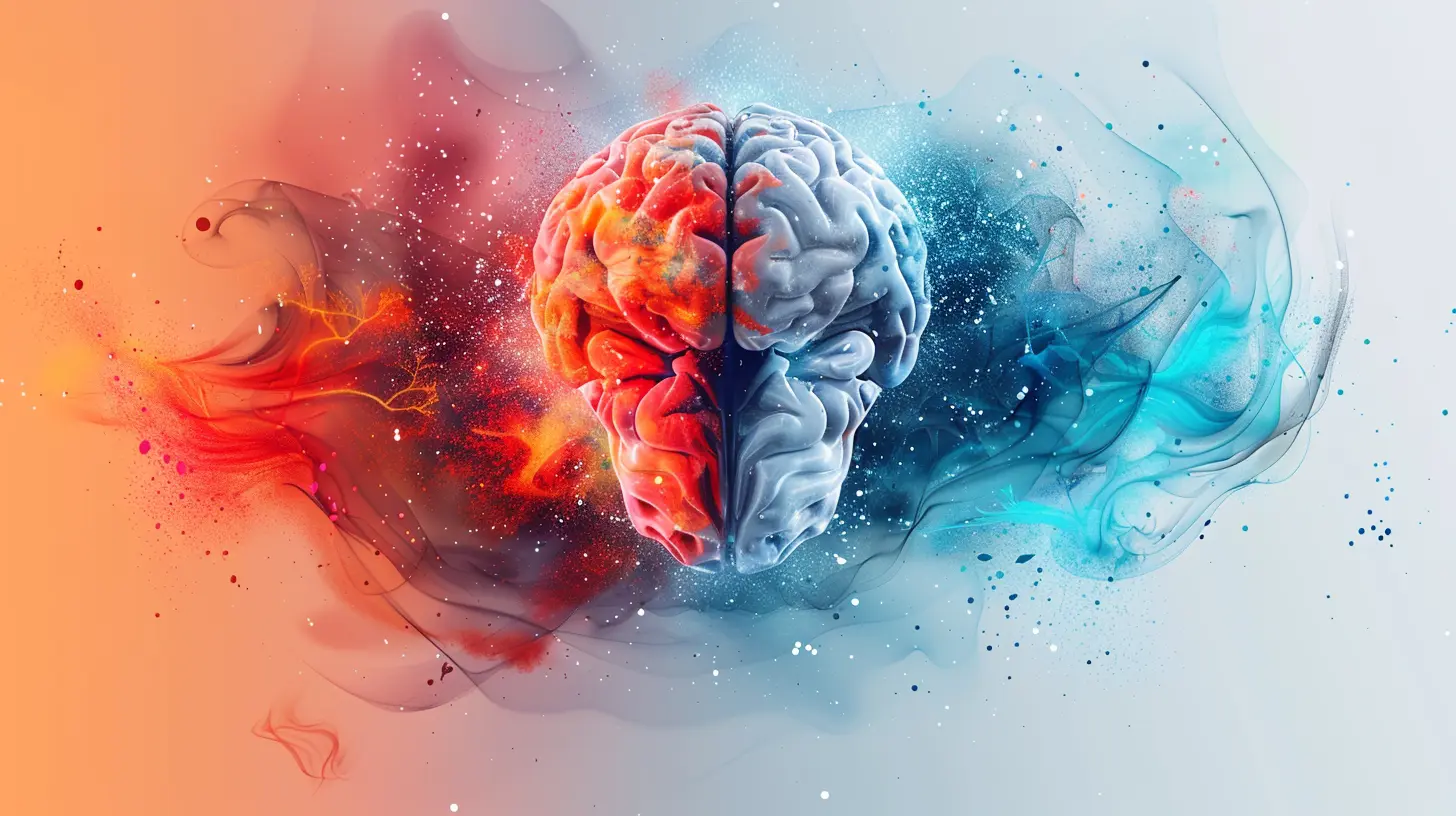Emotional Intelligence vs. IQ: What Really Matters?
6 June 2025
Let’s be honest—how many times have you looked at someone incredibly book smart and thought, “Wow, they’re brilliant!” only to later realize they have the emotional depth of a potato? It happens more often than we’d like to admit.
On the flip side, there are people who may not ace every test or breeze through math problems, but they get people. They can walk into a room and instantly connect, read the vibe, and diffuse tension like a pro.
So, what's the deal? When it comes to real-life success and happiness, what really matters more: Emotional Intelligence (EQ) or Intelligence Quotient (IQ)? Buckle up—we’re about to unpack this in a very human, down-to-earth way.

What Is IQ, Anyway?
Quick refresher: IQ, or Intelligence Quotient, is a number that’s supposed to measure how smart you are cognitively. Think logic, reasoning, math, memory—basically what traditional academics love to test.IQ tests can measure:
- Problem-solving abilities
- Logical reasoning
- Pattern recognition
- Verbal and mathematical skills
That’s all great and useful, especially in school or certain job roles. But here’s the kicker: IQ doesn't tell the whole story.
IQ is like having a super-fast processor in your brain. But what if you don’t know what program to run on it? Or worse, what if you can’t get along with the team you're working with?
That’s where EQ comes in.

So, What Is Emotional Intelligence (EQ)?
Emotional Intelligence is your ability to recognize, understand, and manage emotions—both your own and other people’s. Think of it as your “people skills” mixed with a healthy dose of self-awareness.EQ is made up of five main pillars:
1. Self-awareness – Knowing what you're feeling and why.
2. Self-regulation – Controlling your impulses and staying calm under stress.
3. Motivation – Being driven by intrinsic goals, not just external rewards.
4. Empathy – Understanding what others are feeling.
5. Social skills – Effectively managing relationships and navigating social situations.
It’s like having a GPS for human emotions. It helps you navigate work conflicts, manage friendships, and even build a strong romantic relationship.

The Big Question: Which One Matters More?
Alright, so now we know what IQ and EQ are. But when it comes down to brass tacks, which one really matters more in life?Here’s the truth: It depends.
Yeah, I know... not the clear-cut answer you were hoping for. But life isn’t black and white, is it?
Let’s break it down.

Career Success: EQ Takes the Lead
Think of the most successful people you know. Are they the smartest in the room—or the best at reading the room?Studies have shown that while IQ can get you the job, it’s EQ that helps you keep it. It’s even more important for leadership roles. Why? Because managing people requires emotional sensitivity, active listening, and handling stress—none of which you learn from a physics textbook.
In fact, according to research by TalentSmart:
> People with high EQ make $29,000 more per year on average than those with lower EQ.
Impressive, right?
High EQ employees are:
- Better team players
- More adaptable to change
- Amazing communicators
- Seen as trustworthy leaders
Sure, being smart helps. But if you can't collaborate, manage your temper, or deal with criticism—you’ll hit a ceiling fast.
Relationships: EQ Is Non-Negotiable
Let’s be real: No one cares how well you did on your SATs if you can't listen to your partner when they're upset.Emotional intelligence is the foundation of healthy relationships. Romantic, platonic, family—EQ affects them all. People with high EQ:
- Talk through issues instead of bottling them up
- Are good at apologizing and forgiving
- Understand nonverbal cues
- Don’t overreact or take things too personally
In contrast, people with high IQ but low EQ often struggle with empathy and communication. That’s a tough combo in any relationship.
Decision-Making: They Both Matter
This one’s interesting. While we often think of decision-making as a logical process (thanks to Spock from Star Trek), emotions play a huge role too.Think about it: Have you ever made a decision based on a gut feeling? That’s your emotional intelligence at work.
High IQ helps analyze the facts. EQ helps with reading people, gauging timing, and understanding consequences from a human perspective. The best decisions usually come from a balance of both.
Mental Health: EQ Is a Game-Changer
If you’ve ever felt like your brain was working against you during a moment of high stress or anxiety—you know how it feels when your EQ is struggling.People with high emotional intelligence can:
- Recognize signs of anxiety or depression early
- Express emotions in healthy ways
- Seek support when they need it
- Set boundaries and say “no” without guilt
On the flip side, someone with a sky-high IQ may understand the theory behind mental health, but struggle to handle their own emotions in practice.
EQ makes us more resilient. And in today’s fast-paced world, that’s priceless.
Can You Improve Your EQ and IQ?
Here’s the good news—EQ can totally be improved. Unlike IQ, which is considered more static after a certain age, emotional intelligence is like a muscle. The more you work it out, the stronger it gets.You can boost your EQ by:
- Practicing mindfulness
- Journaling your emotions
- Asking for feedback from trusted friends
- Reading books on communication and empathy
- Actively listening without interrupting
IQ, on the other hand, is mostly inherited and remains around the same throughout life. But you can still sharpen your cognitive skills like memory, problem-solving, and logic through brain-training games and lifelong learning.
Still, EQ has more room for growth—and that’s encouraging!
Real-Life Examples: Where EQ Dominates
Imagine two doctors. One is a genius with a photographic memory. The other? Smart, but more average in IQ—however, they’re kind, empathetic, and calm under pressure.Which one would you want delivering your diagnosis? Yeah, same.
Here’s another scenario:
Two coworkers are up for the same promotion.
- One has the highest IQ in the company but doesn’t play well with others.
- The other often mediates workplace conflicts, builds strong relationships, and routinely uplifts the team.
Guess who’s getting the corner office? Exactly.
EQ and IQ: A Power Couple?
Now, don’t get it twisted—it’s not about choosing one over the other. If EQ and IQ were people, they’d be the ultimate power couple. Think Beyoncé and Jay-Z.IQ lays the foundation. EQ brings the structure to life.
- IQ helps you learn.
- EQ helps you connect.
- IQ gives you the knowledge.
- EQ helps you use that knowledge wisely.
Together? They make magic.
Takeaway: What Really Matters?
At the end of the day, emotional intelligence often has the upper hand in the real world.It’s EQ that helps you:
- Navigate tough conversations
- Manage your emotions during conflict
- Inspire and lead others
- Stay resilient in the face of failure
IQ is great for solving equations, but EQ solves the equation of life.
So, the next time you beat yourself up for not being a genius, remind yourself: Smarts can take you far—but emotional intelligence will take you further.
And honestly? Being emotionally intelligent is kind of like having a superpower. 🧠❤️
Final Thoughts
Whether you're trying to climb the corporate ladder, build meaningful relationships, or simply understand yourself better, emotional intelligence is your secret sauce.Improve it, flex it, and use it. Your brain will thank you—but more importantly, so will the people around you.
all images in this post were generated using AI tools
Category:
Emotional IntelligenceAuthor:

Matilda Whitley
Discussion
rate this article
2 comments
Aria Banks
Emotional intelligence shapes true success!
June 18, 2025 at 4:28 AM

Matilda Whitley
Absolutely! Emotional intelligence plays a crucial role in achieving success by enhancing interpersonal relationships and decision-making.
Quentin McKibben
This article succinctly highlights the critical distinction between emotional intelligence and IQ. It’s a valuable reminder that while cognitive skills are important, emotional intelligence plays a vital role in personal and professional success.
June 15, 2025 at 5:01 PM

Matilda Whitley
Thank you for your insightful comment! I'm glad you found the distinction between emotional intelligence and IQ valuable. Both are essential for success, and understanding their roles can truly enhance our personal and professional lives.


